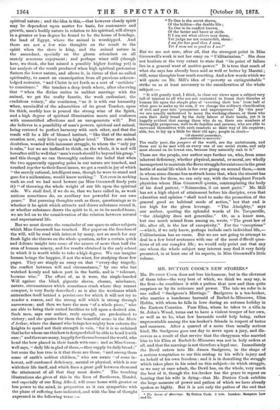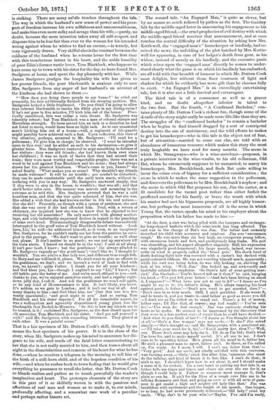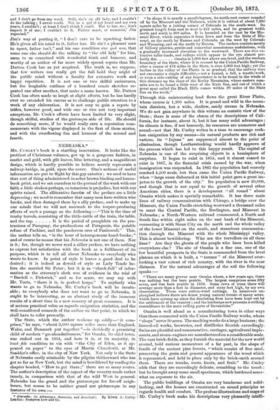MR. DUTTON COOK'S NEW STORIES.*
Ma. Durrox COOK does not lose his humour, but in the cleverest of these tales—the very best of which, we think we may say, is the first—he combines it with a pathos that now and then quite surprises us by its reticence and power. The tale we refer to is one called " Snelgrove's Marriage." Snelgrove is a tea-broker, who marries a handsome barmaid of Barbel-le-Minnows, Eliza Hobbs, with whom he falls in love during an autumn holiday in the Eastern Counties. Poor Eliza, whom he takes to a villa in St. John's Wood, turns oat to have a violent temper of her own, as well as to be, what few barmaids could help being, rather unpresentable among the tea-broker's friends in respect of tastes and manners. After a quarrel of a more than usually serious kind, Mr. Snelgrove goes one day to serve upon a jury, and die- covers as a result of that service thatthe clergyman who married him to his Eliza at Barbel-le-Minnows was not in holy orders at all, and that the marriage is not therefore a legal one. Immediately the Devil enters into Mr. James Snelgrove, in the shape of a serious temptation to use this mishap to his wife's injury and on behalf of his own freedom ; and it is in describing the struggle which takes place in his mind on this subject—in which struggle, as we may at once admit, the Devil has, on the whole, very much the best of it, though the tea-broker has the grace to repent on hearing that his wife is dying—that Mr. Dutton Cook exhibits the large measure of power and pathos of which we have already spoken so highly. But it is not only the pathos of the end that The Boons of Marriage. By Dutton (look. 2 Tole. London: Sampson Low and 0o.
is striking. There are many subtle touches throughout the tale. The way in which the husband's new sense of power and his pros- pect of freedom increase his own selfishness and unreasonableness, and make him even more sulky and savage than his wife,—partly, no doubt, because the mere intention takes away all self-respect, and disposes him to be less fair than ever to the woman for his intended wrong against *whom he wishes to find an excuse,—is tersely, but very vigorously drawn. Very skilful also is the contrast between the .coldness of the husband when he returns home for the first time with this treacherous intent in his heart, and the noble humility of poor Eliza's former rustic lover, Tom Blacklock, who happens to have come up to town with his sister for the day, to have found Mrs. Snelgrove at home, and spent the day pleasantly with her. While James Snelgrove grudges the hospitality his wife has given to her poorer friends, the poor blacksmith is anxious only to save Mrs. Snelgrove from any anger of her husband's on account of the kindness she had shown to them :—
"'How dare you bring these people to my house? he cried out presently, his face additionally flushed frem his stooping position. Mrs. Snelgrove looked a little frightened. 'Do you think I'm going to allow that infernal blacksmith to smoke his filthy pipe in my dining-room ? If he's not gone in five minutes, I'll kick him out of the house. Prac- tically considered, this was rather a vain threat. Mr. Snelgrove was tolerably robust ; but Tom Blacklock was a man of colossal stature and Herculean strength. To have moved him an inch in a direction he had not listed to move, would have been no light task. As to one unassisted man's kicking him out of a house—well, a regiment of life-guards might possibly have achieved such a feat. Upon reflection, this view of the situation, perhaps, occurred to Mr. Snelgrove : 'I'll send for a policeman ; I'll give him in charge,' he observed. '1 wont be intruded upon in this way,' and he added an oath to his declaration—to give it greater force. Mrs. Snelgrove ventured to urge something in defence of her visitors : they were old friends ; she had known them ever since her childhood ; it was no fault of theirs that they had missed their train ; they were most worthy and respectable people; there was not a word to be said against Tom Blacklock and his sister ; they had always shown her the greatest kindness. 'What's come to you, James ? ' she asked finally. 'What makes you so cross? Why shouldn't my friends be made welcome? It will be no trouble ; you needn't be disturbed ; they can be made comfortable until the early train starts, without in- terfering with you in any way.' Mr. Snelgrove answered simply, that if they were to stay in the house, lie wouldn't ; that was all ; and that she'd better take care. His manner was morose and menacing in the extreme as he said this. Mrs. Snelgrove averred that he was a cold heartless man, and that she was quite ashamed of him, that she was. She added a wish that she had known earlier in life his real nature— that she did! Presently, as though with a spasm of penitence, she said that she was sorry if she had offended him. Next, with a return of obduracy, she inquired how she was to know that he objected to her receiving her old associates? He only answered with gloomy mutter- ings, and with indistinctly expressed desires in regard to the punching of some one's head. This exceedingly disagreeable debate was suddenly interrupted by the gruff voice of Tom Blacklock heard without. Look here, Liz,' he said—he addressed himself, as it were to an imaginary Mrs. Snelgrove, for he couldn't really see her from the position he occu- pied in the passage. 'We don't want to give no trouble; so we'll clear out, please. It don't matter to us much ; we can put up anywhere till the train starts. I feared we should be in the way; I said so all along. It isn't your fault, I know; but the gentleman' (be always alluded to Mr. Snelgrove vaguely as 'the gentleman') 'don't like it ; I thought he wouldn't. You see you're a fine lady now, and different to us rough folk. So Mary and me will hook it, please. We don't want to give no offence to the gentleman, we don't ; and we haven't a word of fault to find with you, we haven't: quite t'other. I thank you for all your kindness ; and God bless you, Liz—though I oughtn't to say "Liz," I know ; but • old habits gets the better of me. And we're much obliged to you—and. thanks to you, we've enjoyed ourselves rarely, and had a regular right- down jolly day, I call it. And tell the gentleman we won't call again, or be any kind of ill-convenience to him. It isn't likely, you know. It's seldom as we gets to London ; and it isn't our way at all. And many thanks to him—and God bless him, too' (but this was less fer- vently ejaculated); and good night to you.' And so saying, Tom Blacklock and his sister departed. For all his formidable aspect, he was a well-spoken and agreeably dispositioned young giant, was the blacksmith fron Barbel-le-Minnows. So this is how my friends are to be treated, is it ;' exclaimed Mrs. Snelgrove, as the door closed noon her old associates, Tom Blacklock and his sister. 'And you call yourself a wife!' said Mr. Snelgrove, with exceeding bitterness. They glared at each other. It was a painful scene."
That is a fair specimen of Mr. Dutton Cook's skill, though by no means the best specimen of his power. It is in the close of the story, when Mr. Snelgrove makes up his mind to announce her dis- grace to his wife, and sends off the fatal letter communicating to her that she is not really married to him, and then tosses about all night in the dissatisfaction and remorse of his heart for what he has done,—when he receives a telegram in the morning to tell him of the birth of a still-born child, and of the hopeless condition of his wife,—and when he rushes back to town feeling that he would give everything he possesses to recall the letter, that Mr. Dutton Cook so blends realism and pathos as to touch powerfully the reader's imagination and heart. The grotesque elements of the story are in this part of it so skilfully woven in with the passions and affections of real men and women as to make it, to our minds, profoundly affecting, and a somewhat rare work of a peculiar and perhaps rather bizarre art.
The second tale, "An Engaged Man," is quite as clever, but by no means so much relieved by pathos as the first. The timidity felt by the middle-aged lover in announcing his engagement to his middle-aged friend,—the cruel prophecies of evil destiny with which the middle-aged friend receives that announcement, and at once touches the central difficulty of the situation by asking how Mrs. Kettlewell, the "engaged man's" housekeeper or landlady, had re- ceived the news, the unfolding of the plot hatched by Mrs. Kettle,. well for appearing, in case of her lodger's death from gout, as his widow, instead of merely as his landlady, and the excessive panic which seizes upon the engaged man' directly he comes to under- stand clearly what the game is on which his landlady has embarked, are all told with that breadth of humour in which Mr. Dutton Cook most delights, but without those finer contrasts of light and shadow for which he evidently has more gift than he chooses fully to exert. "An Engaged Man" is an exceedingly entertaining tale, but it is also not a little farcical and extravagant.
The third tale is of a commoner as well as a graver kind, and no doubt altogether inferior in talent to the two first. But the fourth, "A Confirmed Bachelor," con- tains plenty of Mr. Dutton Cook's richest fun, though some of the details of the story might easily be made more life-like than they are. The struggles of the "confirmed bachelor" to remain a bachelor when he begins to find himself dragged by a sort of centripetal destiny into the sun of matrimony, and the wild efforts he makes to get his housekeeper—who in this tale is the object not of fear, but of attraction—married to some one else, are told with an abundance of humorous resource which makes this story the most truly laughable we have read for many months. The scene in which -Mr. Strangways—who is a wine-merchant—proposes, in a private interview in the wine-vaults, to his old cellarman, Old Bat, whom he erroneously supposes to be unmarried, to marry his housekeeper, Mrs. Brocklebank, and finds Bat quite willing to incur the crime even of bigamy for a sufficient consideration ; the scene in which he makes the same suggestion to the policeman, and discovers the policeman to be Mrs. Brocklebank's nephew; and the scene in which Old Bat proposes his son, Jim the carter, as a fit candidate for the vacant post rather than either forfeit the proffered annuity for his family, or brave the wrath with which his master had met his bigamous proposals, are all highly humor- ous, but perhaps the most humorous of all is the scene in which Young Bat, the carter, speaks his mind to his employer about the proposition which his father has made to him :— "At the door, a cart was being piled with the hampers and rectangu- lar long-shaped baskets which the wine-trade has long affected. The cart was in the charge of Bat's son Jim. The father had certainly described his child with accuracy and candour. Jim was uncommon rough.' He was more than six feet high, an overgrown young fellow, with enormous hands and feet, and prodigiously long limbs. His gait was shambling, and his aspect altogether ungainly. Still, his expression was singularly good-humoured ; his large mouth, indeed, was incess- antly on what is properly called the 'broad grin.' His shock head of dusty-looking light hair was crowned with a carter's bat decked with party-coloured ribbons. He was not exerting himself much, apparently; while his cart was being laden, be was idly looking on, chewing the lash of his whip. Well. Jim.' Jim looked up, and awkwardly and bashfully saluted his employer. 'So there's talk of your getting mar- ried.' Jim blushed.—' You've heered tell on it then ?' he said, hanging his head.—'I've just left your father.'—'And he's been letting on about it, I suppose? What have you got to say to it ?'—' I dunno as I've aught to say to it; it's father's doing. He's allays running his head against posts, is father.'—' Don't you want to get married, then ? '- 'Don't care to so very much. Still, I ain't pertikler. If she wants ?t, and he wants it, and you wants it—and father as good as swore you did —I don't see as I'm called on to stand out. There's a bit of money, father says; I'd like that, of course ; any fool would.'—' You've seen her.'—' I've seen her fast enough.' Jim was curiously studying his boots as he spoke. He seemed to be impressed by the discovery that they were in a less perfect state of repair than he could have desired.— ' And what do you think of her ?'—' I dunno as I've thought about her at She's a fine woman.' says my uncle.—' Is she ?' Jim asked simply.—' She's thought so,' said Mr. Strangways, with a perplexed air. --• I'll take your word for it, Sir.'—' You'll marry her, then ?'—' Well, yes. There don't seem any help for it. I'll do as I'm bid ; that's what I'm here for, and to make myself useful. It's all one to me. I don't care to be upsetting father. He's given all his mind to it, father haa. He ain't a pleasant man to upset, father isn't. So there, as I'm called on, I'm ready. As I must, I will. I can't say fairer than that.'— ' Very good.' And my uncle, not wholly satisfied with this converse, was turning away.—' Only.' cried Jim after him, summun else must do the talking, and kind of break it to her, like. I can't do that; it ain't in me. I shouldn't know how to set about it, and I should make a mess of it, for certain. I'm a rare hand at putting my foot into it, as father tells me times and times, and clouts me over the ear for it, all though I could help it • Father or sumtnun must manage it, that's plain as can be. It ain't for the likes of a rough cove like me to be talking flummery and that, and going on ever so with all stets of gam- mon to get round a high and mighty old lady like that.' Jim was breathless with excitement and the length of his speech. One longer, or so long, he had never previously delivered.—' Old lady cried my uncle. Why, she's to be your wife.'—' Maybe. I've said rm ready, and I don't go from my word. Still, she's an old lady, and I couldn't do the talking ; I never could. Not to a gal of my heart and my own years, I couldn't ; at least I don't think I could. But to her. no ; don't expect it of me ; I couldn't do it. Father must, or summtm, Jim repeated."
Jim's way of putting it, "I don't care to be upsetting father.
He's given all his mind to it, father has. He ain't a pleasant man to upset, father isn't," and his one condition sine qua non, that some one else should do the talking to "the old lady" for him, seem to us conceived with wonderful truth and humour, and worthy of an author of far more widely spread repute than Mr. Dutton Cook has as yet acquired. The truth is, we suppose, that few writers can really get the full hold they might of the public mind without a faculty for extensive work and happy repetition. It is not one or two skilful caricatures, but the laughable outlines of a hundred comic sketches re- peated one after another, that make a name known. Mr. Dutton Cook has often made us laugh at slight efforts, but he has hardly ever so extended his canvas as to challenge public attention to a work of any elaboration. It is not easy to gain a repute by trifles, however good, and with one or two not very important exceptions, Mr. Cook's efforts have been limited to very slight, though skilful, studies of the grotesque side of life. He should do something more, if he would really earn a reputation com- mensurate with the vigour displayed in the first of these stories, and with the overflowing fun and humour of the second and fourth.




































 Previous page
Previous page